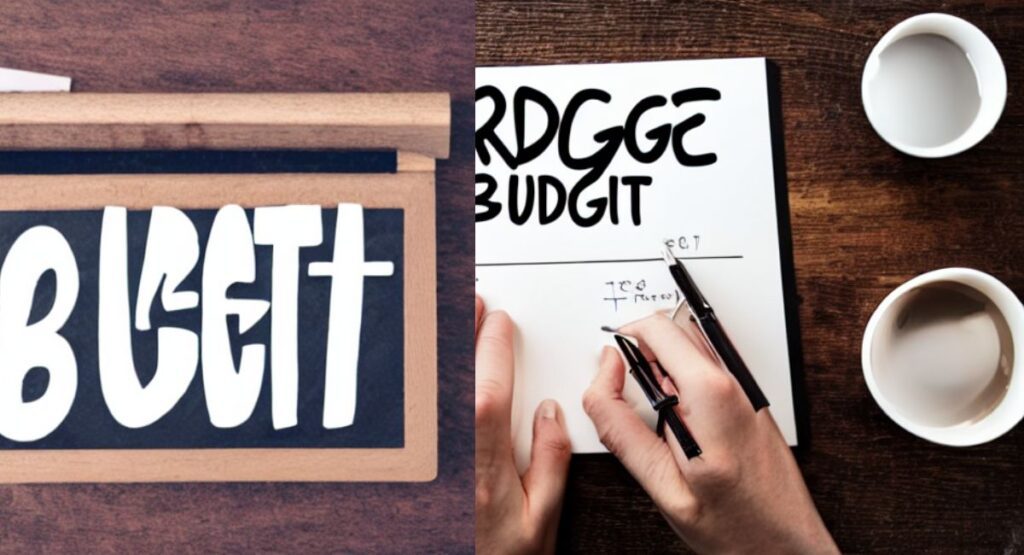10 Ways To Save Money On A Tight Budget
Living on a tight budget can be challenging, but it doesn’t have to mean sacrificing your quality of life. In fact, with a little bit of planning and creativity, you can save money and still enjoy a comfortable lifestyle.
This article will explore 10 ways to save money on a tight budget. From creating a budget and cutting back on needless expenses to taking advantage of discounts and finding free or low-cost entertainment, we’ll provide practical tips and strategies to help you make the most of your income.
By implementing these tips, you can save money, reduce debt, and increase your financial security.

Create a budget:
Creating a budget is the first step in understanding where your money is going and where you can make cuts to save money. A budget is a plan that helps you manage your money by allocating funds to different expenses.
There are various ways to create a budget, but a standard method is to use the 50/30/20 rule. This rule states that you should allocate 50% of your income to necessities like housing and food, 30% to discretionary spendings such as entertainment and shopping, and 20% to savings and debt repayment.
To create a budget, start by listing your income sources and the amount of money you bring each month. Then, list your fixed expenses, such as rent or mortgage, utilities, insurance, and transportation.
Next, list your variable costs, such as groceries, entertainment, and shopping. Once you have your expenses listed, compare them to your income to see where you’re overspending and where you can make cuts.
Many tools are available to help you create a budget, such as spreadsheets, apps, and online tools. Some even connect directly to your bank account to automatically categorize transactions and help you understand where your money is going.
Creating a budget is a process, and it may take some time to adjust it to your lifestyle. Still, once you have a reasonable budget, you’ll better understand your finances and decide where to cut back to save money.

Cut back on unnecessary expenses:
Identify areas where you’re spending money that you don’t need to, such as subscription services or eating out and find ways to reduce or eliminate these expenses.
Cutting back on unnecessary expenses is an effective way to save money, especially when living on a tight budget. The key is to identify areas where you’re spending money that you don’t need to and then find ways to reduce or eliminate these expenses.
One area where many people spend more than they need to is subscription services. For example, if you have multiple streaming services and you’re not using them, consider canceling the ones you don’t use or downgrading to a cheaper plan.
Another example is the monthly subscription services such as a makeup box, snack box, or book club. You can reduce or cancel the services you don’t use if you have multiple services.
Another area where people often overspend is on eating out. Eating out at restaurants can be much more expensive than cooking at home, so consider preparing your own meals more often. By cooking at home, you’ll not only save money, but you’ll also have more control over what you’re eating.
A few more examples of unnecessary expenses include buying expensive coffee every day, impulse buying or buying unnecessary items or clothes, buying high-end products or brand-name products, and extreme membership or gym fees.
Once you’ve identified areas where you’re spending money unnecessarily, consider ways to reduce or eliminate these expenses. It could mean calling companies to negotiate better deals, looking for free or cheaper alternatives, or simply cutting back on certain costs altogether.
It’s important to remember that small changes can add up to significant savings over time, so even if you can only make a small cut to your expenses, it will still help you save money in the long run.

Shop around for better prices:
Compare prices for items you frequently buy, like groceries, and look for ways to save money, such as using coupons or bulk buying. Shopping around for better prices effectively saves money on items you frequently buy, like groceries. By comparing prices at different stores, you can often find the same products at a lower cost.
One way to compare prices is to list the items you regularly buy, then check the prices at different stores. Remember that other stores may have different prices for the same thing, even if they’re part of the same chain. For example, the price of a product at a big box store might be different than the price of the same product at a discount store.
Online shopping can also help you compare prices easily. Many online retailers offer price comparison tools that allow you to compare prices across different websites. Check prices on other marketplaces (like Amazon or eBay) for possible discounts.
Another way to save money when shopping for groceries is to use coupons. Coupons can help you save money on specific products, and many stores will offer additional discounts if you use them. Some newspapers, magazines, and websites, such as RetailMeNot or Coupons.com, have a wide variety of coupons, so be sure to check them out.
Buying in bulk can also be an excellent way to save money on items you regularly use. Things such as paper goods, cleaning supplies, and non-perishable food can save you money by buying in bulk, especially if the store offers discounts for buying in bulk.
It’s important to note that when shopping around for better prices, it’s essential to consider the item’s overall cost, including taxes and shipping costs, as well as the product’s quality and durability. Sometimes, a slightly more expensive item may be a better value in the long run.

Take advantage of discounts:
Look for sales, clearance items, and other discounts to save money on things you need to buy. Taking advantage of discounts is a great way to save money on things you need to buy. There are many different types of deals available, and by looking for sales, clearance items, and other discounts, you can often find ways to save money on the things you need to buy.
One type of discount to look for is sales. Many stores offer deals regularly, which can be a great way to save money on items you need to buy. Some stores provide regular weekly sales, while others have more significant sales at specific times of the year, such as during holidays or end-of-season clearance events.
Clearance items can also be a great way to save money. Clearance items are usually products that are being phased out, have slightly damaged packaging, or are end-of-season items. They are often sold at a discount to make room for new inventory. It’s worth checking out clearance sections when shopping for items you need.
Another way to take advantage of discounts is through loyalty programs, such as membership cards, reward points, and credit card rewards. These programs offer discounts, free items, or cash back when you make purchases.
Discount codes and coupons are also a great way to save money when shopping.
Many retailers offer discounts when you enter a specific code at checkout or use a coupon. These discounts can be found in newspapers, magazines, email promotions, or retailers’ websites.
Additionally, shopping at thrift stores or secondhand shops can save you a lot of money. You can find gently used clothing, furniture, and other household items at a fraction of their original cost.
Always be on the lookout for discounts when shopping and be bold and ask about them if you are still waiting to see any advertised. Remember that a small percentage off can add up to significant savings over time.

Use public transportation or carpool:
Using public transportation or carpooling can save money on transportation costs, including gas and car maintenance. Public transportation, such as buses and trains, can be more cost-effective than driving your own car, especially if you regularly commute to work or school.
Public transport typically costs less per mile than driving a car, and it can also help reduce wear and tear on your vehicle, resulting in lower maintenance costs. Public transportation systems often offer monthly or weekly passes options, which can be more cost-effective than buying a fare each time you use it.
Carpooling is another way to save money on transportation costs. Carpooling involves sharing a ride with one or more people, which can help reduce the cost of gas and wear and tear on your vehicle.
Many employers and schools encourage carpooling by setting up programs or designated carpooling parking spaces. You can also find carpooling groups or apps that match you with people traveling in the same direction as you, making it easy to arrange a carpool.
Both Public transportation and carpooling can also have environmental and traffic benefits. By reducing the number of cars on the road, carpooling and public transit can help reduce air pollution and traffic congestion.
Using public transportation or carpooling may only be practical for some, depending on their location, time schedule, or other reasons. But even if you only use it occasionally, it can significantly affect your transportation expenses.

Cook at home:
Preparing meals is typically less expensive than eating out or ordering in. Cooking at home is a great way to save money on food expenses, as it generally is less costly than eating out or ordering in. When you cook at home, you have more control over the ingredients and preparation methods, which can help you save money and eat healthier.
One of the main advantages of cooking at home is that it can be much cheaper than eating out at restaurants. Restaurants often mark up the cost of ingredients, and the labor and overhead costs are also factored into the price of the meal. Eating out even once a week can add up quickly, so you can save a significant amount of money over time by cooking at home.
Another advantage of cooking at home is that it allows you to use leftovers. You can make large batches of food when you cook at home and save the leftovers for later. This can help you save time and money, as you won’t have to cook as often, and you’ll have a meal ready to go when you’re short on time.
While cooking at home, you can also take advantage of sales and discounts on groceries. It’s easier to plan your meals when you know what is on sale and what items are available in bulk. You’ll be able to save even more money by taking advantage of these deals.
Additionally, cooking at home can also be a fun and rewarding experience. You can try new recipes and experiment with different flavors and ingredients, and it can also be a great way to bond with family and friends.
It’s worth noting that cooking at home doesn’t have to be time-consuming, either. Many quick and easy recipes can be prepared in 30 minutes or less, and you can also find pre-cut and pre-washed produce, frozen or canned ingredients, and meal kits that can help you save time and make cooking at home more convenient.

Avoid impulse buys:
Make a list of what you need before shopping, and stick to it to avoid impulse purchases. Avoiding impulse buys is an essential strategy for saving money, especially when living on a tight budget. Impulse buys are unplanned purchases that are often made on a whim and are not typically necessary. They can add up quickly and eat into your budget, making it difficult to save money.
One way to avoid impulse buys is to list what you need before shopping. This can help you focus on what you actually need and avoid spending money on things you don’t need. When making your list, consider items you’re running low on and items required for upcoming events or projects.
Another strategy is to set a specific budget for each shopping trip. This can help you stay within your budget and prevent overspending. By allocating a set amount of money for each shopping trip, you can ensure that you don’t overspend on impulse buys.
It’s also helpful to shop with cash instead of using credit cards. When you’re using cash, you can physically see the money leaving your hand, making it more heartfelt. It is less likely to impulse buy than when using credit or debit cards.
Another tip is to avoid shopping when you’re feeling emotional. Impulse buys are more likely to happen when you’re feeling happy, stressed, sad, or bored, so it’s a good idea to shop when you’re calm and focused.
You can also practice self-control techniques like taking a break before making a purchase or asking yourself, “Do I really need this?” or “Can I afford it?” to help you resist buying.
It takes time and effort to avoid impulse buying. Still, by being mindful of your spending habits and implementing strategies to resist the impulse to buy, you can save a significant amount of money over time.

Find free or low-cost entertainment:
Instead of spending money on movies or going out, look for free or low-cost entertainment options, such as hiking or checking out a local park.
Finding free or low-cost entertainment options is a great way to save money while still having fun. Instead of spending money on expensive movies or going out, look for alternative options that are either free or low-cost.
One option is to take advantage of free or low-cost events in your community. Many communities have free concerts, festivals, and other events that you can attend.
Some cities also offer free or low-cost museum admissions on certain days of the week or free movie screenings in the park. Checking the local paper, community calendar, or the city’s website can help you stay informed about upcoming events.
Another option is to explore the great outdoors. Going for a hike, bike ride, or walking in nature can be a great way to get some exercise, get fresh air, and enjoy some beautiful scenery, all for free. Many state and national parks also offer a variety of free or low-cost recreational activities, such as camping, hiking, and fishing.
You can also find low-cost entertainment at home. For example, hosting a game or movie night with friends can be a lot of fun and doesn’t have to cost much money.
Another option is to borrow books, movies, or video games from the library. Not only can you access a wide variety of entertainment options, but it’s also free.
Online streaming services such as Spotify, Netflix, and YouTube have many free contents you can access. Also, you can find plenty of free or low-cost online classes, tutorials, and lectures for various hobbies and interests, such as painting, cooking, and language learning.
It’s also worth considering creative and DIY activities, such as knitting, painting, or building. They provide entertainment and can be a rewarding and cost-effective way to create something you can use or display.
Finding free or low-cost entertainment options can be a great way to save money and still have fun. With some creativity and effort, you can find many options that will keep you entertained without breaking the bank.

Refinance loans or negotiate bills:
Look into ways to lower your monthly payments on loans or bills. Refinancing loans or negotiating bills is an effective way to reduce your monthly costs on loans or bills, which can help you save money over time.
Refinancing a loan is obtaining a new loan to pay off one or more existing loans. Refinancing can be beneficial because it may result in a lower interest rate, which can lower your monthly payments. Some of the most common refinanced loans are mortgages, student loans, and car loans.
When refinancing a loan, it’s critical to consider the total cost of the loan, including fees, closing costs, and other charges.
Negotiating bills is another way to lower your monthly payments. Many bills, such as cable or internet, phone or insurance, have some flexibility in their pricing.
You can negotiate a lower rate or a better package by speaking to the provider. By negotiating, you can reduce the amount you’re paying each month.
When negotiating bills, it’s essential to do your research and be prepared to make a case for why you deserve a lower rate. For example, you can point out other providers’ promotions or show that you’ve been a long-time customer.
Another thing to consider is to bundle multiple services together. Many providers offer discounts for customers who bundle their internet, phone, and cable services.
It’s worth noting that refinancing or negotiating bills can take some time and effort, but the potential savings can be significant. Be sure to research your options, compare rates and terms, and be prepared to negotiate to get the best deal possible.
It’s also important to know that some loans, like federal student loans, may have specific refinancing restrictions. It’s vital to understand the terms and conditions of your current loan and to compare them with any new loan terms before making a decision.
Additionally, it’s also wise to consider the long-term implications of refinancing or negotiating bills. Refinancing may extend the length of your loan, and negotiating bills may result in a lower rate for a shorter period. Be sure to consider the long-term impact of these decisions on your overall financial situation.
In summary, refinancing loans or negotiating bills can be a great way to save money on monthly expenses. Still, it’s critical to research, understand the terms and conditions, and weigh the pros and cons of each option before making a decision. It can be time-consuming but could lead to significant savings over time.

Avoid unnecessary fees:
Pay attention to avoid fees such as ATM fees, late payment fees, or other unnecessary fees. Avoiding excessive fees is an excellent strategy for saving money, as even small fees can add up quickly over time. Paying attention to avoid expenses such as ATM fees, late payment fees, or other unnecessary fees can help you keep more of your money in your pocket.
One fee to pay attention to is ATM fees. Many banks charge fees for using ATMs outside their network, which can add up quickly. To avoid ATM fees, you can use an ATM that is part of your bank’s network or withdraw significant amounts of cash less frequently to reduce the number of transactions. Many online banks and credit unions don’t charge ATM fees either.
Another fee to avoid is late payment fees. These fees can be charged when you don’t pay a bill on time. To avoid late payment fees, you can set up automatic payments for accounts that are due regularly or set reminders for yourself to pay bills on time.
Another way to avoid unnecessary fees is to read the fine print when signing up for new accounts or services. Many banks, credit card companies, and other service providers charge fees, such as annual fees, balance transfer fees, or cash advance fees. Be sure to understand the terms and conditions of any account or service you’re considering.
You can also avoid fees by shopping around and comparing different options. Many service providers offer other packages or plans with additional costs, so it’s worth comparing various options to find the one that best meets your needs and has the lowest fees.
It’s also best to take advantage of any fee waivers or refunds that may be available. Many banks and credit card companies offer fee waivers or refunds to customers who maintain a certain account balance or meet other requirements, so be sure to inquire about any available options.
Avoiding unnecessary fees can help you save money and keep more hard-earned cash in your pocket. Paying attention to expenses such as ATM fees, late payment fees, and other unnecessary fees.
Summary
Living on a tight budget can be challenging, but there are various ways to save money and make the most of your income. Some strategies include creating a budget and cutting back on unnecessary expenses.
Shopping around for better prices, taking advantage of discounts. Using public transportation or carpooling, cooking at home, and avoiding impulse buys.
Finding free or low-cost entertainment, refinancing loans, negotiating bills, and avoiding unnecessary fees. By being aware of your spending habits and implementing these strategies, you can save significant money over time and still enjoy a comfortable lifestyle.







